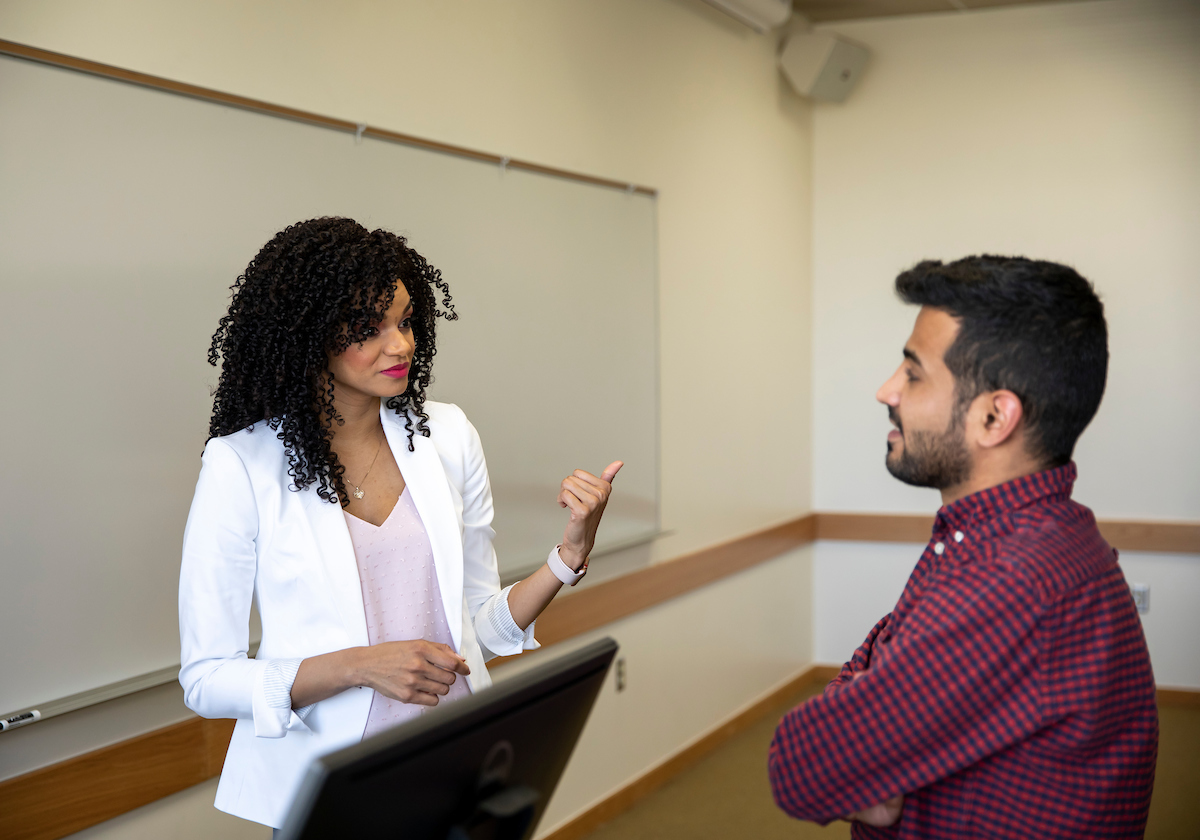
UVU's English as a Second Language community program coordinator guides students to success
By Megan Nielson | Photography by Brooke Steinecke
YINAURY VILLAR was 18 when she left the Dominican Republic, green card in hand, and moved to New
York City. Overwhelmed by the busyness of the city, she moved to Chicago with her
sister, where she began learning English. On the cusp of her 21st birthday, Villar’s
sister asked her to move with her to Utah, where she had graduated from college at
what was then called UVSC. Packing her things, yet again, Villar moved to another
unfamiliar place.
Choosing to continue her education at UVU, Villar took a placement exam and was placed
into regular college courses.
“I wasn’t feeling ready,” she says. “I didn’t feel comfortable enough to be in a classroom
with native speakers. So I begged the ESL (English as a Second Language) program to
let me in, and that was the best thing I’ve ever done.”
She continues, “I didn’t see it as going back to studying English all over again.
I took it as an opportunity to reinforce what I already knew. And I learned a lot
of new stuff, like how to take tests and how to read textbooks.”
After a semester in the ESL program — a program now known as ELL (English Language
Learning) for full-time students — Villar felt confident enough in her English skills to begin taking regular college courses. Since her decision to continue her
English education, Villar has graduated from UVU with a bachelor’s degree in psychology,
and is now the ESL community program coordinator.

The mission of the ESL program is to help community members learn how to read, write,
and speak English, in order to improve their professional and personal life. Open
to anyone— not just students — the program offers four levels of English courses,
ranging from basic to high intermediate, and students are placed in a level after
an initial assessment.
The courses have seen students from all over the world — Brazil, Venezuela, Japan,
Pakistan, Mexico, Ukraine, Chile, Korea, and Guatemala, to name a few. Students have
ranged in age from 17-70. Despite the differences between them, students become united
and form lasting friendships, striving to help each other accomplish their goals.
At the end of each term, they celebrate with food from each of their countries, and
share their culture with one another. One class even had an impromptu talent show,
sharing music and dance from their countries.
“It’s a great night of recognition,” Tammy Nelson, a teacher in the ESL program, says.
“They work really, really hard! A lot of the students work two jobs during the day
and then attend English class at night. It’s an incredible demonstration of their
commitment. We all enjoy the last night of class when students bring their families
to our big cultural night. We eat dinner together, play games, and enjoy listening
to music from their countries.”
“It’s a wonderful celebration,” Nelson says. “They receive their certificates for
completing the course, and just to see the look in their eyes that says, ‘Hey, I’m
moving forward to my goal in learning English for a better life, to be accepted into
the university, for a better job.’ Those are the kinds of things that are really rewarding
in teaching such a diverse group.”
Nelson’s motto is to “celebrate diversity and embrace differences.” The most rewarding
skill she says she has gained is the ability to see the world through the eyes of
her students.
“I have been so touched by what they bring to class, and how we teach one another,”
she says.
Like Nelson, Villar’s responsibilities as coordinator revolve around the success of
the students in the program. She views herself as “a guide to the student, a source.”
“I’m a connection to all the resources they can get,” she says. “Sometimes they don’t
even know they have access to so many things they can take advantage of. That’s what
I think I’m doing here. That’s my duty.”

Villar and her team, a few of whom are also former ESL students, regularly utilize
Turning Point, a program initiated and available at UVU designed to help people through
transitions. If they need clothes, an advisor on building confidence, help finding
a job, child care, or getting their high school equivalency diploma, Turning Point
offers courses and consultations to aid in the processes.
“Lots of students use this,” Villar says.
Turning Point also offers professional clothing for women, and vouchers for men’s
clothing to be used at Deseret Industries. Not only does Deseret Industries provide
these vouchers, it also regularly sponsors students who want to take ESL courses.
It’s partnerships like these that create an ideal environment for success of community
members, Villar says.
“What we’re offering here is a way to change the community’s economy,” Villar says.
“Imagine all those students who just don’t know English, now learning English and
then providing better for their families, making more money, and going to school.
They’ll say, ‘You know what? I want to continue, I want to keep doing this.’”
She adds, “We are serving a low-income community. Sometimes if they don’t have a
sponsor, they can’t come to our classes. But they want to come, and that kills me
because they see their own potential and how much they can grow by coming here. I
think we’re doing a great job here. We are shaping the future of our community here.”
The reach of the ESL program has grown significantly since Villar was selected as
coordinator two years ago.
When the program moved to UVU’s Community Education department and Villar started
as coordinator, the program had 50-60 students per term. The next summer, the program
grew to 120, then to 135, and then to 190 students, the largest term to date. Villar
attributes the growth to recruiting.
“Our recruiting helps a lot,” she says. “We go to festivals and set up a table and we
provide information there. I make flyers all the time, and drop them off to classes
so students can keep telling other people. Having updated information and the way
we treat our students, that speaks a lot. They want to come back, and they tell others
about what we’re doing here.”
Villar’s motivation always comes back to the success of her students. Everything she
does as coordinator is for their benefit. She describes the most rewarding part of
her job as, “When a student comes to my office and they just hug me and say, ‘Thank
you, thank you, I learned so much.’”
When Villar was interviewed for the ESL coordinator position, one of the last ques
tions she was asked was, “Why should we hire you?”
Her response was simple, and poignant.
“Because I am the person that I wish I’d had when I was looking for information, when
I was ready to start studying English,” she says. “Since I went through all of that
and already had that experience, I can tell the student and make them feel that it
is OK what they’re feeling. I can make them feel safe, and that the fear will go away.”
Villar, a single mother of two children, working two jobs, has recently completed
the courses necessary to receive her Master of Education with endorsement in ESL.
All that’s left for her to conquer is her thesis.
“I can tell the students, ‘Look, I am here, you can be me. This is how far you can
get and even farther,’” she says.